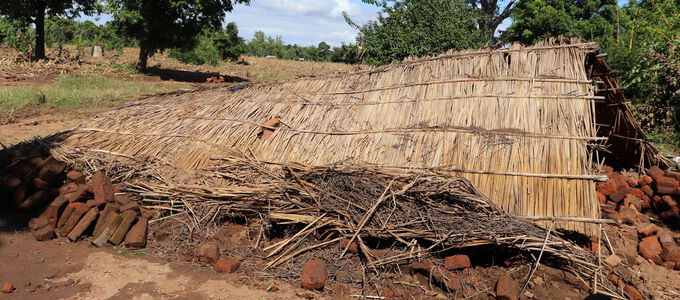
Destruction, homelessness, hunger: of all the countries hit by the cyclone, Malawi was battered the worst. Relief efforts are underway also by New Apostolic aid organisations. What do the people need? District Apostle Kububa Soko wanted to see for himself.
It was one of the longest lasting and strongest cyclones ever observed: formed off the coast of Australia at the end of January, Cyclone Freddy made landfall in south-eastern Africa on 24 February and battered the region until 15 March. The storm first hit Madagascar, before crashing in to Mozambique and Malawi.
After lashing parts of southern Africa, the storm returned with a vengeance and triggered torrential rains that led to flooding, mudslides, and massive devastation in the southern part of the country. In the first 48 hours alone, the storm dumped as much rain on the region as would otherwise have fallen during half a year. The cyclone destroyed towns, fields, and pastures. It took a devastating toll on 14 districts, almost half of the country.
Aid response
The death toll has risen to 700 and is likely to increase. Five hundred people are still reported missing. Weeks after the disaster, chances of finding missing persons alive are slim. Around 660,000 people have been displaced and are living in displacement sites, UN OCHA reports, the United Nations Office for the Coordination of Humanitarian Affairs.
Following the disaster, more than 1.1 million of Malawi’s nearly 20 million people are dependent on humanitarian aid. Hundreds of thousands of hectares of crops were washed away or submerged and tens of thousands of animals were killed, destroying what the people in the region lived on. Because the infrastructure has been destroyed public health risks have increased. The country now fears a new cholera epidemic because of a lack of fresh water and sanitary facilities, which were destroyed in many places.
Emergency aid
Relief operations and emergency programmes have long been underway. Neighbouring countries such as Zambia, Tanzania, and South Africa have sent rescue teams and emergency aid. But often the roads leading into the heavily hit areas have been washed away, making it difficult to reach the people who need the aid.
Europe and North America, as well as the United Nations and the World Bank, have released tens of millions of euros in aid. But UN OCHA estimates that at least 116 million dollars will be needed.
On the ground
The New Apostolic aid organisations NAK-karitativ from Germany and NACRO from Zambia have joined the many other organisations working to provide aid. For this purpose, a special fundraising campaign has been set up.
The two relief organisations are providing essential supplies to around 6,000 people in the districts of Blantyre and Phalombe. The distribution of food, hygiene kits, and mosquito nets in emergency shelters is being coordinated with other organisations on the ground.
Congregations in Zambia, who belong to the same Regional Church as Malawi, were also active. They donated mostly clothes, food, and medicine to be distributed to the most affected areas in Malawi. This was reported by the Church offices at the request of nac.today.
District Apostle visits affected people
How are the people holding up? And what do they need most? District Apostle Kububa Soko wanted to get a picture of the situation and understand the needs. He travelled to the region at the end of March and visited the city of Zomba and then Chilobwe in the Blantyre district.
It was there that he learned that churches had been destroyed. But above all, the District Apostle spoke to brothers and sisters who had lost loved ones or whose livelihood had been destroyed. He was able to get an idea of what the affected families needed most.
Corresponding donations were launched after his return to the Church offices in Lusaka, Zambia. The shipments that District Apostle Soko plans to accompany to Malawi next Tuesday include food, clothing, household utensils, and blankets.






















